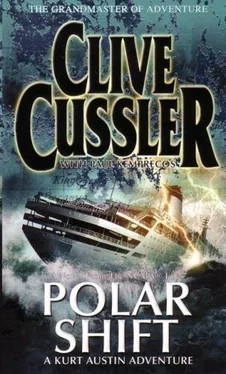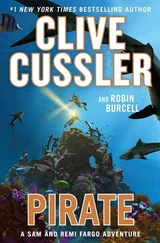The driver heaved a heavy sigh. "The front is beyond that ridge," he said. "You are welcome to discuss the goodness of mankind with your Russian friends. I won't stop you."
The professor drew in on himself like an oyster.
The driver glanced in the rearview mirror and chuckled to himself.
"A wise decision." He lit a cigarette, bending low to shield the light from his match. "Let me explain the situation. The Red Army has crossed the border and blown through the German front as if it were made of fog. Nearly all the inhabitants of this lovely countryside have fled their homes and fields. Our valiant army has been fighting a rearguard action as it runs for its life. The Russians have a ten-to-one advantage in men and arms, and they are cutting off all land routes west as they race toward Berlin. Millions of people are on the move to the coast, where the only escape is by sea."
"God help us all," the professor said.
"He seems to have evacuated East Prussia as well. Consider yourself a fortunate man," the driver said cheerfully. He backed the car up, threw the shift into low gear and drove around the Russian's body. "You are seeing history."
The car headed west, entering the no-man's-land between the advancing Russian juggernaut and the retreating Germans. The Mercedes flew along the roads, skirting deserted villages and farms. The frozen countryside was surreal, as if it had been tilted on its side and emptied of all human life. The travelers stopped only to refuel from the spare gas tanks the car carried in its trunk and to relieve themselves.
Tracks began to appear in the snow. A short while later, the car caught up with the tail end of the retreat. The strategic withdrawal had become a full-fledged rout of army trucks and tanks that lumbered along through the falling snow in a slow-moving river of soldiers and refugees.
The luckier refugees rode on tractors or horse-drawn carts. Others walked, pushing wheelbarrows piled with personal possessions through the snow. Many had escaped with only the clothes on their backs.
The Mercedes rode up on the edge of the road, and its deep tire treads dug into the snow. The car kept moving until it passed the head of the retreat. Around dawn, the mud-splattered car limped into Gdynia like a wounded rhino seeking shelter in a thicket.
The Germans had occupied Gdynia in 1939, expelled fifty thousand Poles and renamed the bustling seaport Gotenhafen, after the Goths. The harbor was transformed into a navy base, primarily for submarines. A branch of the Kiel shipyard was established to turn out new U-boats that were matched with crews trained in nearby waters and sent to sink Allied ships in the Atlantic.
Under orders from Gross Admiral Karl Doenitz, an eclectic flotilla had been assembled at Gdynia in preparation for the evacuation. The fleet included some of the finest passenger liners in Germany, cargo ships, fishing boats and private vessels. Doenitz wanted his submarine and other naval personnel rescued so they could continue to fight. Eventually, more than two million civilians and military personnel would be transported west.
The Mercedes made its way through the city. A bitterly cold wind was blowing in from the Baltic Sea, whipping snowflakes into clouds of icy, stinging nettles. Despite the frostbite conditions, the city's streets were as crowded as on a summer's day. Refugees and prisoners of war slogged through deep drifts in futile search of shelter. Relief stations were overwhelmed with long lines of hungry refugees waiting for a crust of bread or a cup of hot soup.
Wagons piled high with passengers and goods clogged the narrow streets. Refugees streamed from the train station to join the throngs who had arrived on foot. Muffled under layers of clothing, they resembled strange snow creatures. Children were pulled along on makeshift sleds.
The car was capable of speeds reaching 170 kilometers per hour, but it soon became bogged down in traffic. The driver cursed and leaned on the horn. The heavy steel bumper failed to nudge the refugees out of the way. Frustrated at the glacial pace, the driver brought the car to a complete halt. He got out and opened the rear door.
"Come, Professor," he said, rousting his passenger. "Time for a stroll."
Abandoning the Mercedes in the middle of the street, the driver bulled his way through the crowd. He kept a firm hand on the professor's arm, yelled at people to make way and shouldered them aside when they didn't move fast enough.
Eventually, they made their way to the waterfront where more than sixty thousand refugees had gathered, hoping to get aboard one of the vessels lined up at the piers or anchored in the harbor.
"Take a good look," the driver said, surveying the sight with a grim smile. "The religious scholars have been all wrong. You can plainly see that it is cold, not hot, in Hell."
The professor was convinced he was in the hands of a madman. Before Kovacs could reply, the driver had him in tow once more. They wove their way through a snow-covered settlement of tents fashioned from blankets and dodged scores of starving horses and dogs abandoned by their owners. Wagons cluttered the docks. Lines of stretchers carried wounded soldiers brought in from the east aboard ambulance trains. Armed guards stood at each gangway and turned away unauthorized passengers.
The driver cut in front of a passenger line. The steel-helmeted sentry manning the checkpoint raised his rifle to bar the way. The driver waved a sheet of paper printed in heavy Gothic type under the sentry's nose. The guard read the document, snapped to attention and pointed along the dock.
The professor didn't move. He had been watching someone on board the ship anchored at the dock throw a bundle down to the crowd on the pier. The throw was short and the bundle fell into the water. A wailing went up from the crowd.
"What's happening?" the professor said.
The guard barely glanced in the direction of the commotion. "Refugees with a baby can get on board. They toss the baby back down and use it as a boarding pass over and over. Sometimes they miss and the baby goes in the water."
"How gruesome," the professor said with a shudder.
The guard shrugged. "You'd better get moving. Once the snow stops, the Reds will send their planes to bomb and strafe. Good luck." He raised his rifle to bar the next person in line.
The magic document got Kovacs and the driver past a pair of tough-looking SS officers who were looking for able-bodied men to press into duty on the front. They eventually reached a ramp leading onto a ferry crammed with wounded soldiers. The driver again showed his documents to a guard, who told them to hurry aboard.
As the overloaded ferry left the dock, it was watched by a man wearing the uniform of the naval medical corps. He had been helping to load the wounded on board, but he slipped through the mob and away from the waterfront to a maritime junkyard.
He climbed onto a rotting derelict of a fishing boat and went below. He pulled a crank-operated radio from a galley cupboard, fired it up and muttered a few sentences in Russian. He heard the reply against the crackle of static, replaced the radio and headed back to the ferry dock.
The ferry carrying Kovacs and his tall companion had come around to the seaward side of a vessel. The ship had been drawn several yards from the dock to keep desperate refugees from sneaking aboard. As the ferry passed under the ship's bow, the professor looked up. Printed in Gothic letters on the navy gray hull was the name Wilhelm Gustloff.
A gangway was lowered and the wounded were carried aboard the ship. Then the other passengers scrambled up the gangway. They wore smiles of relief on their faces and prayers of thanks on their lips. The German fatherland was only a few days' cruise away.
Читать дальше












